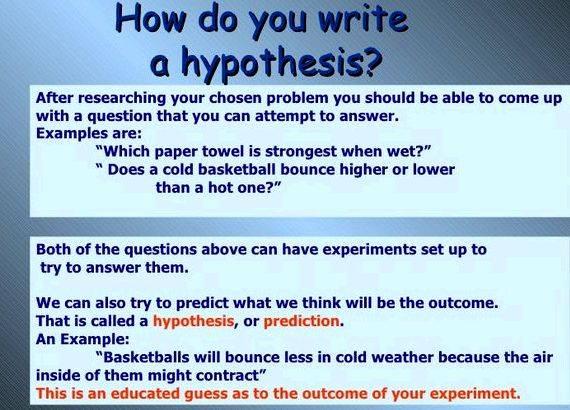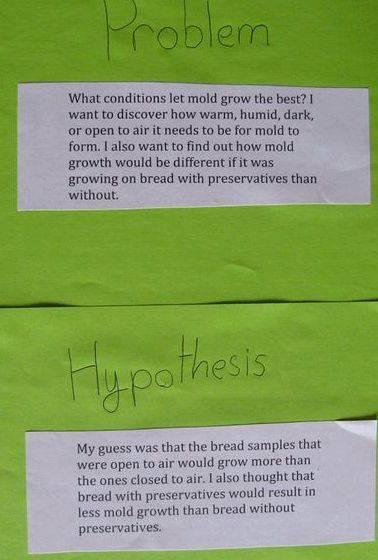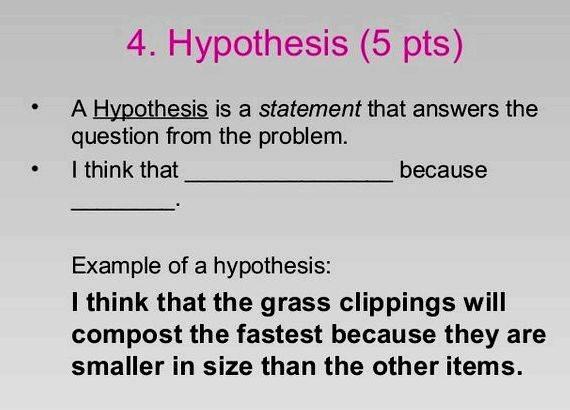

What is a Hypothesis?
A hypothesis is a tentative, testable answer to a scientific question. Once a scientist has a scientific question she is interested in, the scientist reads up to find out what is already known on the topic. Then she uses that information to form a tentative answer to her scientific question. Sometimes people refer to the tentative answer as “an educated guess.” Keep in mind, though, that the hypothesis also has to be testable since the next step is to do an experiment to determine whether or not the hypothesis is right!
A hypothesis leads to one or more predictions that can be tested by experimenting.
Predictions often take the shape of “If ____then ____” statements, but do not have to. Predictions should include both an independent variable (the factor you change in an experiment) and a dependent variable (the factor you observe or measure in an experiment). A single hypothesis can lead to multiple predictions, but generally, one or two predictions is enough to tackle for a science fair project.
Examples of Hypotheses and Predictions
How does the size of a dog affect how much food it eats?
Larger animals of the same species expend more energy than smaller animals of the same type. To get the energy their bodies need, the larger animals eat more food.
If I let a 70-pound dog and a 30-pound dog eat as much food as they want, then the 70-pound dog will eat more than the 30-pound dog.
Does fertilizer make a plant grow bigger?
Plants need many types of nutrients to grow. Fertilizer adds those nutrients to the soil, thus allowing plants to grow more.

If I add fertilizer to the soil of some tomato seedlings, but not others, then the seedlings that got fertilizer will grow taller and have more leaves than the non-fertilized ones.

Does an electric motor turn faster if you increase the current?
Electric motors work because they have electromagnets inside them, which push/pull on permanent magnets and make the motor spin. As more current flows through the motor’s electromagnet, the strength of the magnetic field increases, thus turning the motor faster.
If I increase the current supplied to an electric motor, then the RPMs (revolutions per minute) of the motor will increase.
Is a classroom noisier when the teacher leaves the room?
Teachers have rules about when to talk in the classroom. If they leave the classroom, the students feel free to break the rules and talk more, making the room nosier.
If I measure the noise level in a classroom when a teacher is in it and when she leaves the room, then I will see that the noise level is higher when my teacher is not in my classroom.
What if My Hypothesis is Wrong?
What happens if, at the end of your science project, you look at the data you have collected and you realize it does not support your hypothesis? First, do not panic! The point of a science project is not to prove your hypothesis right. The point is to understand more about how the natural world works. Or, as it is sometimes put, to find out the scientific truth. When scientists do an experiment, they very often have data that shows their starting hypothesis was wrong. Why? Well, the natural world is complexit takes a lot of experimenting to figure out how it worksand the more explanations you test, the closer you get to figuring out the truth.

For scientists, disproving a hypothesis still means they gained important information, and they can use that information to make their next hypothesis even better. In a science fair setting, judges can be just as impressed by projects that start out with a faulty hypothesis; what matters more is whether you understood your science fair project, had a well-controlled experiment, and have ideas about what you would do next to improve your project if you had more time. You can read more about a science fair judge’s view on disproving your hypothesis here.
It is worth noting, scientists never talk about their hypothesis being “right” or “wrong.” Instead, they say that their data “supports” or “does not support” their hypothesis. This goes back to the point that nature is complexso complex that it takes more than a single experiment to figure it all out because a single experiment could give you misleading data. For example, let us say that you hypothesize that earthworms do not exist in places that have very cold winters because it is too cold for them to survive. You then predict that you will find earthworms in the dirt in Florida, which has warm winters, but not Alaska, which has cold winters. When you go and dig a 3-foot by 3-foot-wide and 1-foot-deep hole in the dirt in those two states, you discover Floridian earthworms, but not Alaskan ones. So, was your hypothesis right? Well, your data “supported” your hypothesis, but your experiment did not cover that much ground. Can you really be sure there are no earthworms in Alaska? No. Which is why scientists only support (or not) their hypothesis with data, rather than proving them. And for the curious, yes there are earthworms in Alaska.
Hypothesis Checklist
What Makes a Good Hypothesis?
By Anne Marie Helmenstine, Ph.D. Chemistry Expert
Anne Helmenstine, Ph.D. is an author and consultant with a broad scientific and medical background. Read more
Writing a science fair project report may seem like a challenging task, but it is not as difficult as it first appears. This is a format that you may use to write a science project report. If your project included animals, humans, hazardous materials, or regulated substances, you can attach an appendix that describes any special activities your project required. Also, some reports may benefit from additional sections, such as abstracts and bibliographies.
Continue Reading Below
You may find it helpful to fill out the science fair lab report template to prepare your report.
Important: Some science fairs have guidelines put forth by the science fair committee or an instructor. If your science fair has these guidelines, be sure to follow them.
- Title
For a science fair, you probably want a catchy, clever title. Otherwise, try to make it an accurate description of the project. For example, I could entitle a project, ’;Determining Minimum NaCl Concentration that can be Tasted in Water’;. Avoid unnecessary words, while covering the essential purpose of the project. Whatever title you come up with, get it critiqued by friends, family, or teachers.
- Introduction and Purpose
Sometimes this section is called ’;Background’;. Whatever its name, this section introduces the topic of the project, notes any information already available, explains why you are interested in the project, and states the purpose of the project. If you are going to state references in your report, this is where most of the citations are likely to be, with the actual references listed at the end of the entire report in the form of a bibliography or reference section.
Explicitly state your hypothesis or question.
Continue Reading Below
- Materials and Methods
List the materials you used in your project and describe the procedure that you used to perform the project. If you have a photo or diagram of your project, this is a good place to include it.
Data and Results are not the same thing. Some reports will require that they be in separate sections, so make sure you understand the difference between the concepts. Data refers to the actual numbers or other information you obtained in your project. Data can be presented in tables or charts, if appropriate. The Results section is where the data is manipulated or the hypothesis is tested. Sometimes this analysis will yield tables, graphs, or charts, too. For example, a table listing the minimum concentration of salt that I can taste in water, with each line in the table being a separate test or trial, would be data. If I average the data or perform a statistical test of a null hypothesis. the information would be the results of the project.
The Conclusion focuses on the Hypothesis or Question as it compares to the Data and Results. What was the answer to the question? Was the hypothesis supported (keep in mind a hypothesis cannot be proved, only disproved)? What did you find out from the experiment? Answer these questions first. Then, depending on your answers, you may wish to explain ways in which the project might be improved or introduce new questions that have come up as a result of the project. This section is judged not only by what you were able to conclude, but also by your recognition of areas where you could not draw valid conclusions based on your data.
Appearances Matter
Neatness counts, spelling counts, grammar counts. Take the time to make the report look nice. Pay attention to margins, avoid fonts that are difficult to read or are too small or too large, use clean paper, and make print the report cleanly on as good a printer or copier as you can.
Previous answers to this question
This is a preview of an assignment submitted on our website by a student. If you need help with this question or any assignment help, click on the order button below and get started. We guarantee authentic, quality, 100% plagiarism free work or your money back.
 Get The Answer
Get The Answer